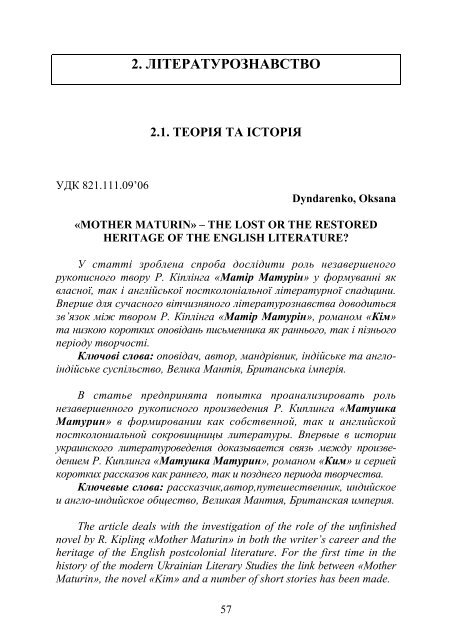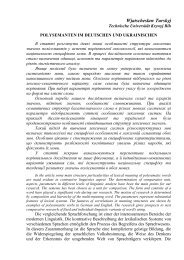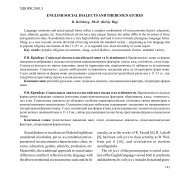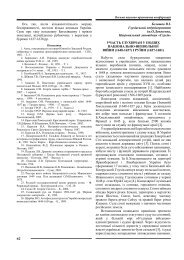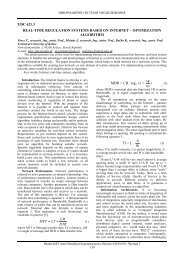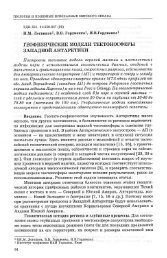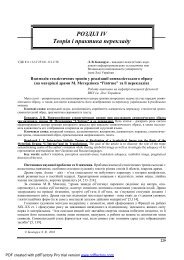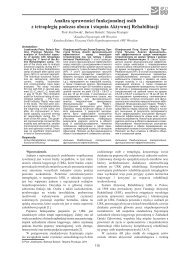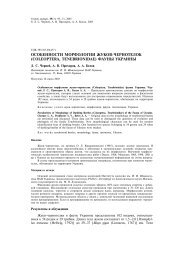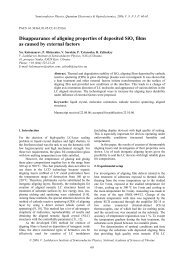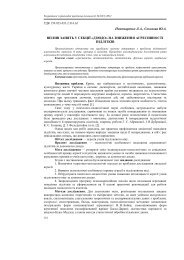Kipling
Kipling
Kipling
Create successful ePaper yourself
Turn your PDF publications into a flip-book with our unique Google optimized e-Paper software.
УДК 821.111.09’06<br />
2. ЛІТЕРАТУРОЗНАВСТВО<br />
2.1. ТЕОРІЯ ТА ІСТОРІЯ<br />
57<br />
Dyndarenko, Оksana<br />
«MOTHER MATURIN» – THE LOST OR THE RESTORED<br />
HERITAGE OF THE ENGLISH LITERATURE?<br />
У статті зроблена спроба дослідити роль незавершеного<br />
рукописного твору Р. Кіплінга «Матір Матурін» у формуванні як<br />
власної, так і англійської постколоніальної літературної спадщини.<br />
Вперше для сучасного вітчизняного літературознавства доводиться<br />
зв’язок між твором Р. Кіплінга «Матір Матурін», романом «Кім»<br />
та низкою коротких оповідань письменника як раннього, так і пізнього<br />
періоду творчості.<br />
Ключові слова: оповідач, автор, мандрівник, індійське та англоіндійське<br />
суспільство, Велика Мантія, Британська імперія.<br />
В статье предпринята попытка проанализировать роль<br />
незавершенного рукописного произведения Р. Киплинга «Матушка<br />
Матурин» в формировании как собственной, так и английской<br />
постколониальной сокровищницы литературы. Впервые в истории<br />
украинского литературоведения доказывается связь между произведением<br />
Р. Киплинга «Матушка Матурин», романом «Ким» и серией<br />
коротких рассказов как раннего, так и позднего периода творчества.<br />
Ключевые слова: рассказчик,автор,путешественник, индийское<br />
и англо-индийское общество, Великая Мантия, Британская империя.<br />
The article deals with the investigation of the role of the unfinished<br />
novel by R. <strong>Kipling</strong> «Mother Maturin» in both the writer’s career and the<br />
heritage of the English postcolonial literature. For the first time in the<br />
history of the modern Ukrainian Literary Studies the link between «Mother<br />
Maturin», the novel «Kim» and a number of short stories has been made.
Key words: a narrator, a story-teller, a loafer, Indian and Anglo-<br />
Indian society, the Giant Robe, British Empire.<br />
We are used to describing <strong>Kipling</strong> as the imperial story-teller or the<br />
preeminent bard of Empire, but we also put an aim in our investigation<br />
to show an alternative portrait of <strong>Kipling</strong>, and one indebted more to<br />
journalism and its quest for novelty. The reaserchers of the postcolonial<br />
critics, such as: Homi Bhabha, S. Suleri, H. Tiffin, E. Said, M. Pratt,<br />
A. Lawson, P. Brantlinger, B. Ashcroft, G. Griffiths, W. Harris, J. Clifford,<br />
Gobind, J. Rignall and others studied the heritage of R. <strong>Kipling</strong>, but ignored<br />
the importance of the unfinished novel «Mother Maturin» as considered<br />
it o be lost. The scientific novelty of our research implies the restoration<br />
of R. <strong>Kipling</strong>’s novel through the study of his collections of short stories<br />
and the novel «Kim» in the context of the postcolonial discourse. The<br />
theoretical importance of our research is that it gives opportunity to the<br />
deeper further study of the unfinished novel «Mother Maturin» as it<br />
gives ground to change the orientalist view of the literary heritage of R.<br />
<strong>Kipling</strong>. For what is equally apparent in his early texts is a journalistic<br />
flair for the dramatic potential of a good story. The Anglo-Indian stories,<br />
many later collected in anthologies such as «Plain Tales» and «Life’s<br />
Handicap», were published as newspaper fiction (literal «turnovers») and<br />
included impressionistic and fragmented, specular bit-part sketches of<br />
native life. His narratives often employ the persona of journalist-narrator<br />
as the narrative correspondent: the man-on-the-spot who relays information<br />
for a reading audience. While his narrative persona is not always objective<br />
or distanced from the events that unfold, his Junction within the narrative<br />
is akin m journalistic mediation and interpretation of news. In «The<br />
Return of Imray» and «The Mark of the Beast» his presence serves to<br />
verify the authenticity of strange affairs and to mediate their experience<br />
for readers. In «The Strange Ride» and «The Man Who Would Be King»<br />
he comes across unusual incidents, which he (re)stages for readers’ benefit.<br />
In «The City of Dreadful Night» and «To be Filed For Reference» his<br />
nightly exploration of parts of the native city yield tableaus of native and<br />
colonial lives. In this respect, his narrator is often a petty pilferer or loafer,<br />
either stealing bits of other people’s lives or stories of their lives to fashion a<br />
novel story.<br />
<strong>Kipling</strong>’s narrator is usually a journalist who has an affinity for the<br />
underside of official life. In «The Man Who Would Be King», his<br />
narrator classifies himself as a «wanderer and vagabond» whose occupation<br />
sanctions his experience of Things in «out-of-the-way-corners of Empire».<br />
58
The epigram which prefaces the tale – brother to a beggar and to a prince –<br />
indicates not only «the right sort of king» but his worth as a writer. While<br />
it is dangerous to equate the frame-narrator with <strong>Kipling</strong>, there are passages in<br />
«The Man Who Would Be King» which are lifted directly from <strong>Kipling</strong>’s<br />
record of his own travel experiences in the Princely States. On assignment<br />
for the Pioneer in Rajasthan (which resulted in «Letters of Marque»),<br />
he describes himself in a letter to his cousin Margaret Burne-Jones in<br />
similar terms as his frame-narrator. He describes himself as having railed<br />
and rode and drove and, tramped and slept in King’s palaces or under the<br />
stars with natives in desolate wayside stations. Diverse experiences contribute<br />
to the narrator’s authority; «wonderful and awful things» experi-enced<br />
during the journey become fodder for his writing. <strong>Kipling</strong>’s early years as<br />
a journalist in India show a marked fascination with peripheral figures and<br />
experiences outside the pale, if we quote the Burne-Jones letter, dated<br />
January 25, 1888:<br />
«Underneath our excellent administrative system; under the piles of<br />
reports and statistics; the thousands of troops: the doctors: and the<br />
civilian runs wholly untouched and unaffected the life of the peoples of the<br />
land ... immediately outside of our own English life, is the dark and<br />
crooked and fantastic; and wicked: and awe-inspiring life of the «native»...<br />
I have done my best to penetrate into it and have put the little I have<br />
learnt into the pages of «Mother Maturin» – Heaven send that she may<br />
grow into a full blown novel before I die. My experiences of course are<br />
only a queer jumble of opium dens, night houses, night strolls with<br />
natives; evenings spent in their company in their own homes (in the men’s<br />
quarter of course) and the long yarns my native friends spin me, and one<br />
or two queer things I’ve come across in my own office experience». 1<br />
This passage contributes to the myth of <strong>Kipling</strong> as a great mediator of<br />
native culture. His knowledge is imaged as comprehensive and covers not<br />
only the everyday official life of the administrator but also its hidden native<br />
counter-part. The contact is illicit and vaguely sexual; but the underworld<br />
with its «dark, crooked and fantastic» forms and stories provide the source<br />
and inspiration of his tales. The most compelling image that emerges from<br />
this description of his nightwalks is an image of the artist as loafer or<br />
flaneur. The artist walks through Indian streets in the same manner as the<br />
Baudelairean flaneur strolls along the pedestrian mall of the Parisian city,<br />
taking in the sights or as a Dickensian nightwalker on his slumming<br />
expeditions in London. India yields a similar magic-lantern of familiar<br />
59
and phantasmagoric images.There is a touch of the romantic and the<br />
bohemian in <strong>Kipling</strong>’s (descriptions of his) expedition. <strong>Kipling</strong> speaks<br />
in his letter to Margaret, dated November 28, 1885, of how «little an<br />
Englishman can hope to understand [these natives]: I would that you see<br />
some of the chapters in «Mother Maturin» and you will follow more<br />
closely what I mean». 2 Here, then, is the contradictory movement in <strong>Kipling</strong>’s<br />
project. His task is both to mystify and to reveal native life for all to see.<br />
«Mother Maturin» is <strong>Kipling</strong>’s unfinished (lost) novel about the<br />
unutterable horrors of lower class Eurasian and native life; it is said to<br />
have been gleaned from his own experiences in India. The Orientalist<br />
influence of the French Symbolists, the romantic heritage of decadent<br />
artists and the literary influence of Dickens may have contributed to the<br />
novel but, as a result of family disapproval, the novel was never published.<br />
But there is more than a glimpse of this aspect of <strong>Kipling</strong>’s persona.<br />
«Kim» is the only one of <strong>Kipling</strong>’s longer works of fiction that can<br />
stand comparison with his extraordinary achievements in the short story<br />
form. He started to write the novel in 1899 and completed it in the summer of<br />
1900.The picaresque life story of an Irish soldier’s orphan, living on his<br />
wits in India, was a subject <strong>Kipling</strong> had had in mind at least since 1894.<br />
But the roots of «Kim» go deeper, to «Mother Maturin», a novel of the<br />
Indian underworld that the young reporter had begun in 1885 before he<br />
was twenty. Lockwood <strong>Kipling</strong> advised his son against continuing with<br />
the project, and «Mother Maturin» was abandoned, but Rudyard returned<br />
to the manuscript and may have harvested ideas from it while he was at<br />
work on «Kim». The novel, then, draws on <strong>Kipling</strong>’s vivid memories of<br />
his own Indian childhood, his observations as a young reporter, and his<br />
earlier attempts to cast his Indian experience into ambitious literary form,<br />
as well as representing a sort of act of mnemonic will, a conjuring up of<br />
the country he would never see again, as he wanted to remember it. Kim<br />
is the «Little Friend of All the World», a ragamuffin child of the streets of<br />
Lahore. In his relation to the underworld of Lahore City away from<br />
departmental life. In a letter to his ex-editor Kay Robinson, dated April<br />
30,1886, <strong>Kipling</strong> writes:<br />
«I hunt and rummage among ‘em; knowing Lahore City – that<br />
wonderful, dirty, mysterious ant hill – blindfold and wandering through it<br />
like Haroun-al-Raschid in search of strange things ... the bulk of my<br />
notes and references goes to enrich a bruised tin tea-box where lies –<br />
350 fcp. pages thick – my «Mother Maturin». The novel that is always<br />
being written and yet gets no furrader ... heat and smells of oil and spices,<br />
60
and puffs of temple fncense, and sweat, and darkness, and dirt and lust<br />
and cruelty, and above all, things wonderful and fascinating innumerable.<br />
Give me time Kay – give me seven years and three added to them and<br />
abide the publishment of Mother Maturin. Then you shall sit down in<br />
your gas-lit, hot water pipe warmed office, at midnight, and shall indite a<br />
review saying that the book ought never to have been written». 3<br />
The letter is built on a series of contrasts: «dirty/clean, magical<br />
(strange)/rational, sensual/sensible (ordinary, safe), dangerous/gas-lit, hot<br />
water pipe warmed office» which depict experiences outside the English<br />
official world. «The House of Suddhoo», «The Gate of Hundred<br />
Sorrows», «The City of Dreadful Night» (two versions) and «To Be<br />
Filed For Reference» are all obsessed with journeys into the native<br />
quarter and with meeting figures who know it well. I will comment here<br />
only on the short story «To Be Filed For Reference», because it deals<br />
directly with the aesthetics of loaferism that we have been discussing.<br />
«To Be Filed» is the very last tale to be included in the first bookform<br />
collection of his short stories, «Plain Tales From The Hills». The<br />
narrative recounts a meeting with a loafer who has gone native. Formerly<br />
an Oxford man, McIntosh Jellalludin is now a dissolute drunk, who is<br />
married to a native woman «not pretty to look at». As a literary aesthete<br />
turned «Mussulman», he is also, the narrator records,the most interesting<br />
loafer that he had had the pleasure of knowing for a long time. The<br />
narrator’s nocturnal visits to his loafer friend are a form of education.<br />
McIntosh Jellaludin’s mind was a «perfect rag-bag of useless things», a<br />
hybrid list of classical quotations, literary knowledge, native customs and<br />
languages. But it is precisely this hybrid world which attracts the narrator’s<br />
attention and it is McIntosh Jellaludin’s knowledge of native customs<br />
that the frame-narrator covets for his own artistic ends, that he had his<br />
hand on the pulse of native life... was a fact... As Mohammedan faquir –<br />
as McIntosh Jellaludin – he was all that he wanted for his own ends. He<br />
smoked several pounds of my tobacco, and taught me several ounces of<br />
things worth knowing McIntosh Jellaludin’s claim on posterity lies in a<br />
big bundle of papers, «all numbered and covered with fine cramped writing»,<br />
which he calls, in the manner of the Bible, «the Book of McIntosh<br />
Jellaludin». The bundle of papers is an account of the loafer’s knowledge<br />
and experience of India: showing what he saw and how he lived, and<br />
what befell him and others this text, like all romantic visionary texts, is<br />
described as being paid for in seven years damnation. A literary child of<br />
two or more cultures, the book (described by the loafer as «my only child»)<br />
will be the lost gospel of British India. Strickland’s legendary knowledge<br />
61
of things native will pale in comparison. McIntosh dies exhorting the narrator<br />
to publish it: «Do not let my book die in its present form... Listen Now! I am<br />
neither mad nor drunk! That book will make you famous».<br />
Is it stillborn or still to be born? McIntosh’s book is also the book of<br />
Mother Maturin, «being also the account of the life and sins and death of<br />
Mother Maturin». The narrative of «To Be Filed For Reference» ends<br />
on a note of ambiguity. It is stillborn because the child who is a product of<br />
two cultures must be a sterile hybrid and because Strickland, the wise<br />
policeman and expert on native life and custom «thought the writer an<br />
extreme liar». But McIntosh Jellaludin’s book is still-to-be-born because<br />
by the close of the story, «Mother Maturin» has yet to be published. The<br />
references to McIntosh Jellaludin’s «Mother Maturin» matches what<br />
we know of <strong>Kipling</strong>’s own unpublished novel; his own descriptions of the<br />
content of his ‘350 fcp. pages’ of writing kept in a tea tin matches the<br />
narrator’s descriptions of the loafer McIntosh’s book.<br />
<strong>Kipling</strong>’s book contains «all things wonderful and fascinating<br />
innumerable» and was to show his «hand on the pulse of native life».<br />
<strong>Kipling</strong>’s «Mother Maturin» by all accounts seems to have been as<br />
contentious and provocative a piece of work as McIntosh Jellaludin’s<br />
book. In a letter to his aunt Edith Mcdonald on July 30 1885, <strong>Kipling</strong><br />
describes the early drafts:<br />
Further I have really embarked to the tune of 237 foolscap, pages on<br />
my novel – «Mother Maturin» – an Anglo-Indian episode. Like Topsy it<br />
‘growed’ while I wrote and I find myself now committed to a two volume<br />
business at least. Its not one bit nice or proper but it carries a grim sort of<br />
a moral with it and tries to deal with the unutterable horrors of lower<br />
class Eurasian and native life as they exist outside reports and reports<br />
and reports. I haven’t got Pater’s verdict on what I’ve done. He comes up<br />
in a couple of days and will then sit in judgement. Trixie says its awfully<br />
horrid: Mother says its nasty but powerful and I know it to be in a large<br />
measure true». 4<br />
At this time, the manuscript exerted a powerful hold over <strong>Kipling</strong>,<br />
who describes it as an «unfailing delight», and his own writing at a «stage<br />
where characters are living with me always». Mrs Hill, a close friend of<br />
<strong>Kipling</strong> in India, read parts of the earlier work and describes the story as<br />
that of an old Irishwoman who kept an opium den in Lahore. She married<br />
a civilian and came to live in Lahore – hence a story how government<br />
secrets came to be known in the Bazaar and vice versa. The seedier side of<br />
62
Indian and Anglo-Indian urban life in all its «unutterable horrors» is<br />
part and parcel of <strong>Kipling</strong>’s poetics of decadence; the book is ‘nasty but<br />
powerful’. When <strong>Kipling</strong> returned to London in the nineties, the novel<br />
was still unfinished. <strong>Kipling</strong>’s letter to his former editor Kay Robinson,<br />
dated April 30,1886, written in about of depression, speaks of his<br />
frustration at London’s literary scene and his desire to return to India as<br />
an Anglo-Indian writer. «Mother Maturin» is again invoked «as a book<br />
that would launch his literary career». 5<br />
«To Be Filed For Reference» does not belong to the original «Plain<br />
Tales» series of stories in the Civil and Military Gazette; it is also placed at<br />
the end of the anthology. Hence, «To Be Filed» gestures towards the<br />
significant new novel that <strong>Kipling</strong> hoped to publish in the near future. Yet<br />
«To Be Filed» contains a coda disclaiming authorship. The disclaimer is<br />
strategic, given the negative reception of his unfinished novel. In this<br />
light, one may be forgiven for taking McIntosh Jellaludin to be a<br />
«Doppelgänger» of the respectable journalist of the text. McIntosh<br />
Jellaludin, the loafer gone «fantee» must be disavowed in order to<br />
preserve the integrity of the narrator’s colonial identity. But <strong>Kipling</strong>’s<br />
disavowal coexists with his avowal; it is present, for example, in the<br />
transferential relation between journalist and loafer.<br />
In one of his last essays, Freud discusses fetishism’s dual and<br />
contradictory attitudes towards external reality, and its effects on subjectivity.<br />
He argues that the contrary dynamics of avowal and disavowal produces a<br />
splitting of the ego: everything has to be paid for in one way or another,<br />
and this success is achieved at the price of a rift in the ego which never<br />
heals but which increases as time goes on . He would argue that in this<br />
context, <strong>Kipling</strong>’s contradictory attitudes towards «Mother Maturin» result<br />
in a splitting which is repeated in the conflict between the respectable<br />
journalist and the disreputable loafer. It is the unstable doubling of the<br />
loafer/journalist-author that results in the joke which closes «To Be Filed»:<br />
«If the thing is ever published, some one may perhaps remember this<br />
story, now printed: a safeguard to prove that McIntosh Jellaludin and not<br />
myself wrote the Book of Mother Maturin. I don’t want the Giant’s Robe<br />
to come true in my case».The Giant’s Robe could be perceived as the<br />
whole British empire which, from one side, hid all the «unutterable horrors»<br />
of the Indian and Anglo-Indian urban life,and, from the other side could<br />
gulp anyone, who dared unravel its hidden vices.<br />
The case of McIntosh Jellaludin is interested because it reminds us<br />
that there is a side to <strong>Kipling</strong>’s story-telling other than that of imperial<br />
bard and vision ary, who was responsible for some of the «founding<br />
63
legends» of Empire. In this final tale of «Plain Tales», and in my reading<br />
of some of the early short stories, <strong>Kipling</strong> also emerges as flaneur-tramp,<br />
whose inquisitive and often deliber-ately voyeuristic gaze uses others for<br />
his own ands. <strong>Kipling</strong>’s early collections consist of a rag-bag of different<br />
stories. The two sides are part of one whole.<br />
The narrator’s occupation enables him to take up a privileged position<br />
ascollector of experiences; it allows him to function as a sympathetic ear<br />
for localgossip and to traverse racial and class boundaries in search of a<br />
good story. Asboth listener and teller of the tale, he is free from the network<br />
of social tabooswhich keep him within the strict boundaries of Anglo-<br />
Indian society. Hisvoyeurism is parasitic on the society he moves in and<br />
out of and his position aswriter and journalist sanctions such voyeurism.<br />
<strong>Kipling</strong> as imperial story-teller offers both the magic and enchantment of<br />
the Indian story and its voyeurism; Edmund Gosse’s reference to <strong>Kipling</strong> as<br />
the master of a new kind of terrible and enchanting peepshow with readers<br />
that crowd around him begging for just one more look» captures the spirit<br />
of his early work. Gosse’s comment also hints at the spirit of commerce<br />
which informs the trade in stories and lives. <strong>Kipling</strong>’s acknowledgement<br />
of his occupation as journalist-writer is an acknowledgement of the market<br />
forces and commodity relations which characterise the literary scene in<br />
the late nineteenth century. The journalist-writer’s response to Gobind’s<br />
advice in the preface to «Life’s Handicap» underscores a commercial<br />
awareness: «...in regard to our people they desire new tales, and when all<br />
is written they rise up and declare that the tale were told better in such<br />
and such a manner ... Nay, but with our people, money having passed, it is<br />
their right; as we should turn against a shoeseller in regard to shoes if<br />
these wore out. If then I make a book you shall see and judge». 6<br />
John Rignall asserts a close relation between the flaneur and the<br />
commodity culture of the nineteenth century by highlighting the «significant<br />
affinity» between spectator and reader. Not only are both spectator and the<br />
realist novel products of the commercial culture of the nineteenth century,<br />
but the novel, itself a commodity, presents in the figure of this observer an<br />
image of the very consumer on whom it depends.<br />
Sara Suleri’s is perhaps the most perceptive comment: writing about<br />
Kim she observes that <strong>Kipling</strong>’s genius lies in his «apprehension of the<br />
applicability of journalism to imperial narration». For journalism revels<br />
in novelty and the text’s youthful celebration of novelty and its successive<br />
«montage of autonomous moment» is a major part of its picaresque<br />
attracting. The same might be said for <strong>Kipling</strong>’s short fiction; in displacing<br />
the figure of the traditional storyteller for that of the kerani, «Life’s<br />
64
Handicap» and «Plain Tales» juxtaposition of short stories – «collected<br />
from all places, and all sorts of people» – produces an entertaining<br />
timeless montage of other worlds. Chronology, Suleri argues, is always a<br />
thorny issue for the «story of empire» and imperial narratives display both<br />
coyness and discomfort when dealing with «their situatedness» within<br />
history. «To name the present tense of history is of course to turn to<br />
journalism ... in the story of journalism, history is perpetually novel and<br />
necessarily occurs in the absence of precedent». In <strong>Kipling</strong>, we have a<br />
«brilliant literalization of the colonial moment» where «empire confronts<br />
the necessary perpetuation of its adolescence in relation to its history». 7<br />
So, we can conclude that R. <strong>Kipling</strong> gave an objective glimpse of the<br />
British colonial rule in India as a real historical story-teller and a writer.<br />
His novel «Mother Maturin» wasn’t lost but was further on restored in<br />
such narratives as: «Life’s Handicap», «Plain Tales», «The House of<br />
Suddhoo», «The Gate of Hundred Sorrows», «The City of Dreadful<br />
Night», «Kim» and «To Be Filed For Reference», – to be contributed to<br />
the English literary heritage of this period. <strong>Kipling</strong>’s acknowledgement of<br />
his occupation as journalist-writer is an acknowledgement of the market<br />
forces and commodity relations which characterise the literary scene in<br />
the late nineteenth century,so his strong desire to vividly show the pros<br />
and cons of the Indian and Anglo-Indian urban life in all its «unutterable<br />
horrors» was oppressed by his father, a British colonel, but couldn’t stop<br />
the young writer from depicting all these scenes in the works, listed above,<br />
using the mask of the «faithful friend» McIntosh Jellaludin, fulfilling the<br />
roles of the loafer and the story-teller simultaneously.<br />
NOTES AND REFERENCES<br />
1. <strong>Kipling</strong> R. The <strong>Kipling</strong> Papers, University of Sussex Manuscripts, Box 11, File 6-7.<br />
2. Ibid., File 9-10.<br />
3. Ibid., Box 17, File 25.<br />
4. Ibid., Box 11, File 11-12.<br />
5. Ibid., Box 18, File 26.<br />
6. Said E.W. Culture and Imperialism. – L.: Vintage, 1994. – 444 р.<br />
7. Suleri, Sara. The Rhetoric of English India. – Chicago, 1992. – P. 111-112.<br />
–––––––––––––––––––––––––<br />
© Dyndarenko, Оksana, 2010<br />
65


